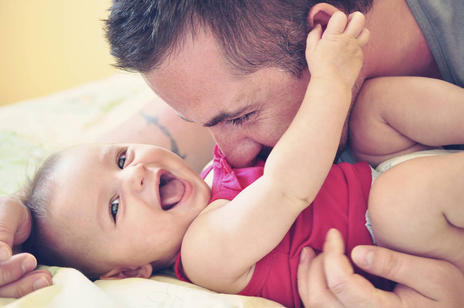This is an excerpt from the third article in a four-part series, written in partnership with TheAtlantic.com, examining the role of fathers in American families.
The 10-month-old twins call Frandy “Da Da.” He changes their diapers, mixes up their formula and helps shoulder the burden of providing food, clothing and medical care.
But the girls aren’t his children; Frandy’s girlfriend Cassie was pregnant when they started dating. When, a few months later, the two decided to move in together, “I knew raising the kids was part of the package,” said Frandy, a 23-year-old from inner-city Boston.
His own 6-year-old daughter lives across town with her mother and her mother’s boyfriend. Frandy sends a check every month.
Such complex family arrangements are becoming increasingly common — particularly among the poor, like Frandy and Cassie. Nearly 40 percent of unwed parents with low education levels share child-rearing responsibilities with a co-residential boyfriend or girlfriend, according to a 2013 report from the United States Census Bureau. Oftentimes these couples share at least one biological child, but in 27 percent of relationships, moms or dads are stepping in to raise children they didn’t conceive.
U.S. government programs designed to help such families, however, haven’t evolved with the population. Based on decades-old stereotypes that single mothers are raising children alone and single dads are “deadbeats,” the majority of U.S. anti-poverty programs almost exclusively serve women and children, said Jacquelyn Boggess, co-director of the Center for Family Policy and Practice, a Wisconsin-based think tank that focuses on supporting low-income parents.
The welfare system, as a result, can become a muddled mess of rearranging rather than relieving poverty. Single, non-custodial fathers bear the brunt. But dads don’t suffer alone. Because the poor pull together to support one another, everyone absorbs the pinch.
“It’s like seven people in bed together, sharing a very small blanket,” Boggess said. “If you move the blanket over to cover up one person who’s chilly, someone else is going to get cold.”
……
The biggest flaw in current anti-poverty policies is that they don’t take into account the increasing role that fathers play in children’s lives, Berger said. As mothers go to work at higher rates, fathers are taking on more child-rearing responsibilities. Even if parents are splitting the financial burden, though, only one parent can benefit from anti-poverty programs like SNAP or the earned-income tax credit. So, while mom gets help paying the bills, dad, who is oftentimes just as poor, is held responsible for his share of the costs.
“Helping women and not men creates huge gender asymmetry, which makes it harder for couples to stay together,” said Harvard sociologist Kathryn Edin, author of “Doing the Best I Can: Fatherhood in the Inner City.” “Men can’t earn enough money to earn a place in the family. They become dispensable.”
Expanding the earned-income tax credit to include non-custodial parents could go a long ways in addressing poverty, Edin said. Not precisely welfare, the EITC is a tax subsidy for low-income workers that increases as wages go up. The idea, she said, is to make good on the promise that “if you work, you won’t be poor.”
Read the rest here: http://www.deseretnews.com/article/865597337/Should-welfare-programs-pay-more-attention-to-dads.html

